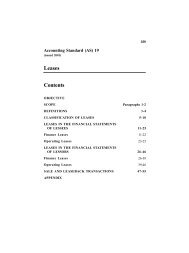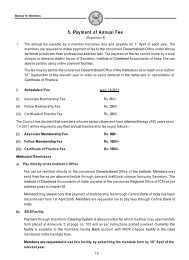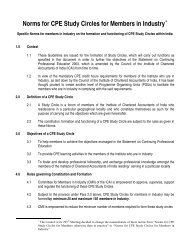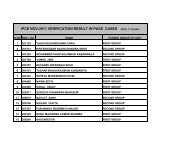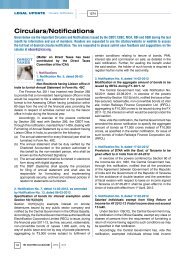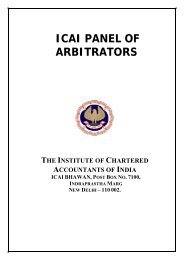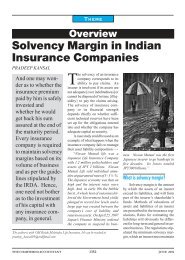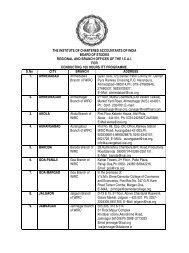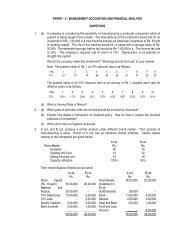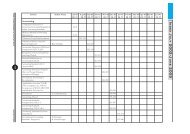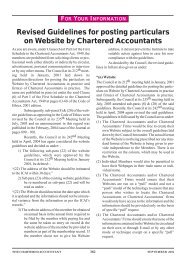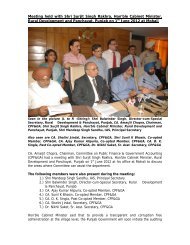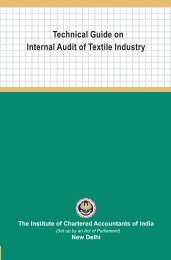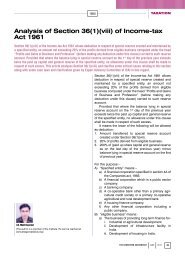The Chartered Accountant
The Chartered Accountant
The Chartered Accountant
You also want an ePaper? Increase the reach of your titles
YUMPU automatically turns print PDFs into web optimized ePapers that Google loves.
DECEMBER 2008 962 THE CHARTERED ACCOUNTANT<br />
ACCOUNTING<br />
Honourable Supreme Court has held that the prescribed AS 22, to the<br />
extent it requires recognizing deferred tax liabilities/ assets in the Financial<br />
Statements, is only a gap filling exercise. <strong>The</strong> Central Government has not<br />
exceeded its authority in adopting prescribed AS 22 in exercise of section<br />
642(1)(a). Prescribed AS 22 is not inconsistent with/ contrary to any of the<br />
provisions of Companies Act including Schedule VI. Hence prescribed AS<br />
22 should be mandatorily followed by all companies.<br />
ment prescribed accounting standards 1-7 and 9-29 as<br />
recommended by ICAI [herein after referred to as<br />
“prescribed AS ___(relevant number)”].<br />
<strong>The</strong>se Rules were notified by the Central Government<br />
in exercise of powers conferred under section 642(1)(a)<br />
read with sections 211(3C) and 210A(1).<br />
As per the Rules, every company and its auditor(s) shall<br />
comply with the Accounting Standards in the manner<br />
specified in Annexure to those Rules in preparation of<br />
General Purpose Financial Statements.<br />
Further para4 of Part I of the Annexure to the Rules<br />
state that Accounting Standards, which are prescribed,<br />
are intended to be in conformity with the provisions<br />
of applicable laws. However, if due to subsequent<br />
amendments in the law, a particular accounting standard<br />
is found to be not in conformity with such law,<br />
the provisions of the said law will prevail and the financial<br />
statements shall be prepared in conformity with<br />
such law.<br />
As regards the accounting treatment of exchange differences<br />
in respect of imported fixed assets, the following<br />
foot note is contained in prescribed AS 11 under<br />
para13 – “Recognition of Exchange Differences”-<br />
“It may be noted that the accounting treatment of<br />
exchange differences contained in this Standard is required<br />
to be followed irrespective of the relevant provisions<br />
of Schedule VI to the Companies Act, 1956.”<br />
Thus the Central Government has vide the Rules stated<br />
that the accounting treatment for exchange difference<br />
in respect of imported fixed assets contained in Schedule<br />
VI to the Act should not be followed.<br />
{It is interesting to note that the Central Government<br />
has not attempted to make similar amendment in the<br />
Income-tax Act, 1961 like it had done originally in<br />
1968.Hence section 43A of the Income-tax Act, 1961<br />
continues on the statute book}.<br />
Issue<br />
<strong>The</strong> issue which has arisen consequently is - Whether<br />
a company should follow Schedule VI or the prescribed<br />
AS 11 in accounting for exchange differ-<br />
ence in respect of imported fixed assets?<br />
{It is interesting to note that this controversy exists<br />
only in case of accounting for exchange difference in<br />
respect of imported fixed assets not in case of indigenous<br />
fixed assets which have been acquired out of<br />
Foreign Currency External Commercial Borrowings<br />
(ECBs)}<br />
Discussion<br />
A question which was before Honourable Supreme<br />
Court in case of J. K. Industries Ltd. v. Union of<br />
India [2008] 297 ITR 176 in the context of prescribed<br />
AS 22- ‘Accounting for taxes in income’ to the extent<br />
it requires recognizing deferred tax liabilities/ assets in<br />
the Financial Statements<br />
“Whether Accounting Standard 22 (AS 22) entitled 'accounting<br />
for taxes on income' insofar as it relates to<br />
deferred taxation is inconsistent with and ultra vires the<br />
provisions of the Companies Act, 1956, ('the Companies<br />
Act'), the Income-tax Act, 1961 ('the I. T. Act') and<br />
the Constitution of India ?”<br />
<strong>The</strong> judgement of Honourable Supreme Court is a<br />
very detailed one. We have reproduced hereunder some<br />
extracts of the judgement which are relevant to the issue<br />
under consideration (Emphasis supplied wherever<br />
considered necessary):<br />
“Section 211(1) requires the balance-sheet to be in the<br />
form set out in Part I of Schedule VI "or as near thereto<br />
as circumstances admit". <strong>The</strong> said phrase "or<br />
as near thereto as circumstances admit" allows<br />
adoption of improved techniques in the presentation<br />
of accounts to shareholders. It is important<br />
to note that the information which is required to be<br />
given to shareholders pursuant to Schedule VI should<br />
be given in a manner which they will understand and<br />
which must give a "true and fair" view of the company's<br />
affairs as also it must give a proper picture of<br />
the company's profits (losses) for the relevant year. By<br />
the Companies (Amendment) Act, 1999, sub-sections<br />
(3A), (3B) and (3C) as well as a proviso thereto stood<br />
inserted in section 211 of the Companies Act with effect<br />
from October 31, 1998, in order to provide for



